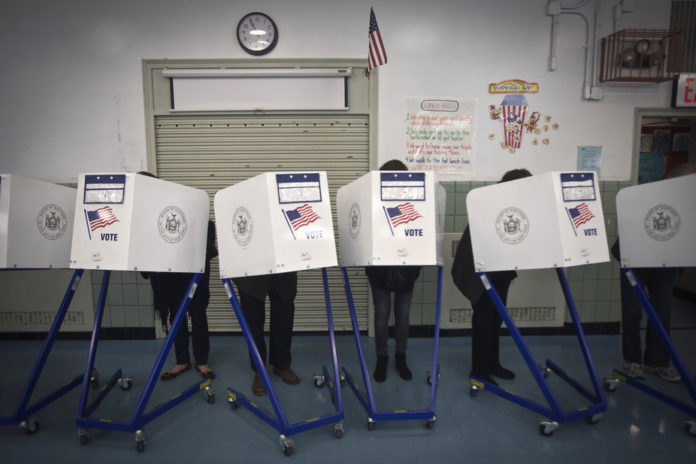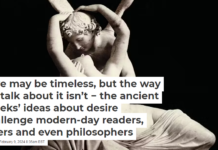
By Paru R Shah, University of Wisconsin-Milwaukee; David Cook Martín, Grinnell College, and Marcus Anthony Hunter, University of California, Los Angeles
Editor’s note: voter turnout in this year’s midterm elections – 36.6% – was lower than in the 2010 midterms (40.9%.) According to the Pew Research Center the “party of non-voters” is more racially diverse than those Americans who showed up at the polls. So what do the midterm results have to say about ethnic minority voters?
A tipping point for ethnic minorities?
Paru Shah, Associate professor of political science at the University of Wisconsin – Milwaukee.
A number of key Democrats, including the Obamas and Clintons, made last-minute pushes to get black and Latino voters to the polls in states where analysis suggested their votes could tip the balance. And the numbers of black and Latino early voters were promising. But in the end it wasn’t enough to preserve the Democratic majority in the Senate.
The 2014 Midterms were also poised to be significant for representative democracy with large numbers of racial/ethnic minority and female candidates running across the country, particularly for statewide offices that have traditionally been more difficult for them to win. The Joint Center for Political and Economic Studies (www.jointcenter.org) noted 100 black candidates ran for office this year, more than any other state or federal election in history. The National Association of Latino Elected Officials) counted 42 Latinos running across the country in statewide elections.
And although many of the candidates lost tight races, the 2014 elections will go down in history as record making and breaking. South Carolina’s Tim Scott (Republican) became the first African-American senator to win election in the South since Reconstruction. The GOP is sending its first black female legislator – Mia Love – to Congress. Alex Mooney (Republican) is the first Latino Member of Congress from Virginia. And Alma Adam (North Carolina, Democrat) becomes the 100th women currently serving in Congress.
Misplaced wagers: how Democrats and Republicans are Getting it Wrong with the Latino Electorate
David Cook-Martín, Associate Professor of Sociology at Grinnell College and director of its Center for International Studies.
US midterm election results suggest that both Democrats and Republicans placed the wrong bets on how Latinos would vote.
Democrats wagered on the unwavering support of Latinos and, while still substantial, it was sufficiently eroded to cost that party crucial votes in very close races. In at least two key states (Colorado and Texas), support of Latinos has declined on the order of 10 to 12% relative to the 2012 elections. While there are other factors at work in midterm elections, there is some indication that Latino voters are angry about the inaction on immigration reform, particularly in the form of executive action.
Republicans won in the short term, but are losing the long game. Current demographic trends show a phenomenal growth in the number of Latinos – 25% of children under five are Latino according to the Brookings Institution] and this will undoubtedly have an impact on future elections. And yet, as legal scholar Ian Haney Lopez has argued, Republicans have chosen to participate in invidious “dog whistle politics”, invoking race in coded language.
Republicans have made the wrong decision by not diversifying their party; Democrats have made the wrong decision by waffling on immigration issues. Each mistaken wager is having or will have its cost.
An initial assessment of the impact of voter ID laws
Marcus Hunter, Assistant Professor of Sociology, UCLA
With the upholding of Voting ID laws in midterm battleground states, the midterm election offered the first opportunity to assess the real impact of such laws on turnout. As predicted we have begun to witness those celebrating the effectiveness of these laws at the same time that we hear stories of those who stayed home or didn’t vote because of the new voter ID provisions.
Just 24 hours since voting day and the reports are emerging about people being turned away and forced to provide alternative identification (that they may or may not have). The stories are not pretty. In Texas, voters reported that they were refused a ballot due to the lack of “proper” identification. Others in the Georgia and North Carolina were turned away because their polling places had been changed due to alterations in their congressional districts.
These voters, mostly poor and and from minority groups were left with little recourse but to address this issue on-site. As a result, we may never know what the true turn out was for the midterms. We may also never know how truly invested black and brown Americans are and were in the selection of their elected officials.
![]()
Paru R Shah receives funding from the National Science Foundation. She is an elected school board member in Shorewood, WI.
David Cook Martín has received funding from the National Science Foundation. He is affiliated with the Scholars Strategy Network.
Marcus Anthony Hunter does not work for, consult to, own shares in or receive funding from any company or organisation that would benefit from this article, and has no relevant affiliations.
This article was originally published on The Conversation.
Read the original article.




















